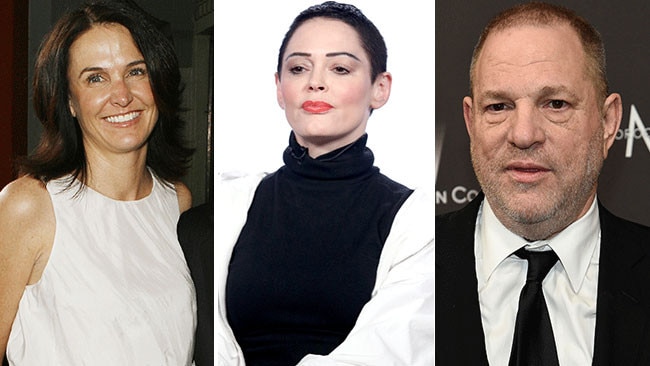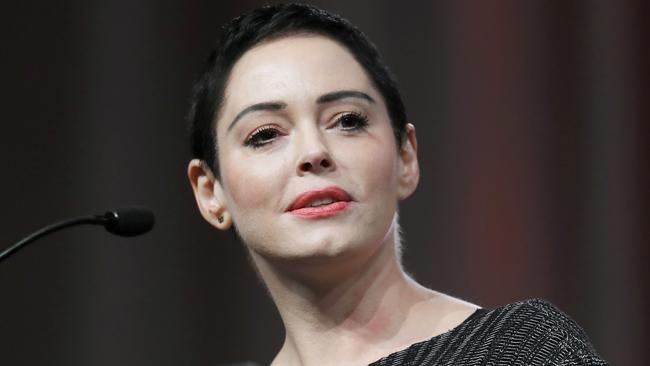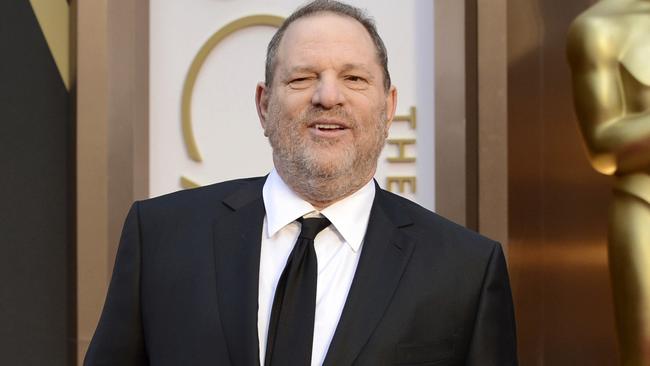Suicide of Rose McGowan manager sparks #MeToo backlash
The family of Rose McGowan’s manager has hit out after her suicide amid backlash over her alleged role in the Weinstein affair.

A veteran Hollywood executive who was Rose McGowan’s manager when the actress was allegedly raped by Harvey Weinstein has committed suicide, media reports, citing her family say.
Relatives of Jill Messick, who was 50, said in a statement circulated to US media that she had battled depression for years, but had recently felt “victimised” by inaccurate reports of her role in the affair.
Messick, who worked for Addis-Wechsler — now Industry Entertainment — managed McGowan when the actress claimed she was attacked by Weinstein in a hot tub at the 1997 Sundance Film Festival.
Dozens of Hollywood women have accused the disgraced movie mogul of sexual misconduct.
McGowan is promoting an upcoming memoir and is one of the most prominent advocates in the #MeToo social media movement against sexual harassment.
She told The New York Times in October that Messick had arranged the Weinstein meeting, which began in a hotel room.
The revelation — and being further dragged into the headlines as part of an email exchange released by Weinstein — had a damaging effect on Messick’s state of mind, the family said.
“The speed of disseminating information has carried mistruths about Jill as a person, which she was unable and unwilling to challenge,” the family statement reads. “She became collateral damage in an already horrific story.”

The family went on to accuse McGowan of making “slanderous statements against her,” which the mother-of-two chose not to rebut for fear of undermining victims of sexual assault.
“She opted not to add to the feeding frenzy, allowing her name and her reputation to be sullied despite having done nothing wrong. She never chose to be a public figure, that choice was taken away from her,” the statement said.
Messick went to Santa Barbara High School and graduated from the University of Southern California with a communications degree.
She began producing films and television shows in 1999, and also worked as an executive at Paramount’s Lorne Michaels Productions.
Her movie production credits include “She’s All That,” starring Freddie Prinze Jr, Mark Waters’ “Mean Girls,” art biopic “Frida,” with Salma Hayek, and action film “Masterminds” with Zach Galifianakis, Kristen Wiig and Owen Wilson.
McGowan’s representatives did not immediately respond to a request for comment.
Messick family’s statement:
“’The Movement’ just lost one of its own.
Jill Messick was a mother of two children, a loving wife and partner, a dear friend to many and a smart entertainment executive. She was also a survivor, privately battling depression which had been her nemesis for years.
Today she did not survive. Jill took her own life.
Jill was victimised by our new culture of unlimited information sharing and a willingness to accept statement as fact. The speed of disseminating information has carried mistruths about Jill as a person, which she was unable and unwilling to challenge. She became collateral damage in an already horrific story.
Jill believed in the Movement. She supported every woman finally coming forward to share their dark truths and expose those who had committed previously unspeakable deeds. She was loyal. She was strong. Jill was many things, but she was not a liar.
Over the past few months, many women have come out with allegations against Harvey Weinstein, including Rose McGowan, who has repeatedly spoken with the press, striking out against not only her alleged attacker, but a great many others. One of them was Jill, who chose to remain silent in the face of Rose’s slanderous statements against her for fear of undermining the many individuals who came forward in truth. She opted not to add to the feeding frenzy, allowing her name and her reputation to be sullied despite having done nothing wrong. She never chose to be a public figure, that choice was taken away from her.
Now that Jill can no longer speak for herself, it’s time to set the record straight.
In January 1997, Jill was an entry level manager at Addis Wechsler. One of her first clients was Rose McGowan, and one of Jill’s first duties was to set up a breakfast meeting with Harvey Weinstein during the Sundance Film Festival. Following the meeting, Rose told Jill what had happened — that she made the decision to remove her clothes and get in the hot tub with him — a mistake which Rose immediately regretted. Rose never once used the word rape in that conversation. Despite this, Jill recognised that Harvey had done something untoward to Rose, if not illegal. She immediately went to her bosses, the partners of Addis Wechsler, to recount Rose’s story and to insist that they address the situation. They told Jill that they would take care of it. The ensuing arrangements between Rose and Harvey were then negotiated, completely without Jill’s knowledge. At that time, all Jill knew was that the matter was settled and that Rose continued making films with the Weinsteins. She never knew any details until recently, when Rose elected to make them public.
Ten months later, in November of 1997, Jill received a call from the Miramax exec VP of
production, recruiting her for a job as an executive at Miramax Films working in production in Los Angeles. Jill was hired based on merit and her excellent work of over two years as a young development executive working with Woods Entertainment, (prior to her time at Addis Wechsler).

Rose’s most recent round of press to promote her book have included new stories involving Jill. The constant press attention Rose has garnered in print and on National TV led to Harvey Weinstein releasing two documents. One of these was an email which Jill wrote to him months prior to the first NY Times piece coming out, and at his request. In this e-mail, Jill offered the truth based on what she remembers Rose telling her about the Sundance account. In the face of Rose’s continued and embellished accusations last week, Harvey took it upon himself to release the e-mail without her consent.
Five years ago, Jill suffered a manic episode. Anyone familiar with bipolar disorder knows that it is a cruel and vicious disease. With the help of doctors, her family and friends, Jill rebounded. Jill had fought to put her life back together. After a long job search, she was in negotiations to run the production division for a new entertainment company.
Seeing her name in headlines again and again, as part of one person’s attempt to gain more attention for her personal cause, along with Harvey’s desperate attempt to vindicate himself, was devastating for her. It broke Jill, who was just starting to get her life back on track.
What makes Rose’s inaccurate accusations and insinuations against Jill ironic was that she was the first person who stood up on Rose’s behalf, and alerted her bosses to the horrific experience which Rose suffered. Twenty years ago, as a very junior person in a management company hierarchy, Jill exhibited her integrity in doing the right thing — she raised the red flag with the heads of her firm. In the face of inappropriate behaviour, Jill handled the situation appropriately. Hers is one of the only stories that has stayed consistent over time as we watch other media reported tales morph to beget further attention.
While journalists serve an important role in exposing predatory behaviour, we are seeing
irresponsible choices and an addiction to sensationalism which leads to inconsistent storytelling. The media is a powerful tool not to be taken lightly. Most individuals would be horrified to have their name spotlighted in a major international news story — let alone their photograph. We cannot forget that the media is a fearsome tool which cannot be used indiscriminately or even inadvertently to create further victims. There is a responsibility when using a platform to accurately expose criminals, predators, mistruths and misdeeds while protecting the actual truth of third parties.
As we collectively seek to take action in an effort to right the wrongs so brazenly and inhumanely repeated for a generation, we must not forget one simple truth: words have power. While we illuminate the dark corners for hidden truths, we must remember that what we say, particularly in the media, can have just as much impact if not more than our actions. We must ask more of ourselves, and of each other. We must take a moment to consider the ramifications and consequences of what we say and what we do.
Words matter.
Someone’s life may depend on it.”
If you or someone you know may be at risk of suicide, call Lifeline (13 11 14) or the Suicide Call Back Service (1300 659 467), or see a doctor
AFP


